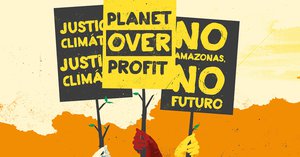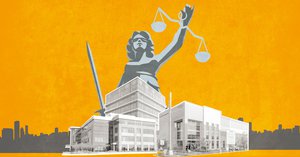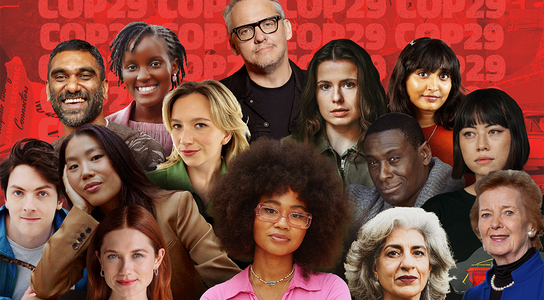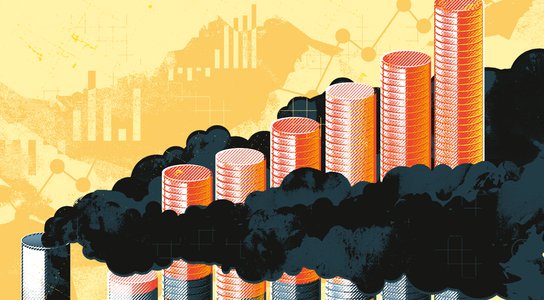2021 was a crucial year in the battle against the climate crisis. The extraordinary mobilisation of people from across the world at the COP26 Summit offered some tangible hope that our movement is becoming strong enough to secure the urgent change that we need. However, of course there is much more to do.
Thinking about the challenges that 2022 brings, and the opportunities for us at Global Witness to play our part in meeting them, three areas in particular stand out: accountability for the fossil fuel industry, ending investment in forest destruction, and elevating the voices of those most affected by climate breakdown and who are taking a stand against it.
Fossil fuel lobbying tactics still strong
One of the main reasons that the climate crisis remains unsolved is the damaging influence wielded by fossil fuel companies on the political leaders that are supposed to be finding a way out of the crisis which these very same companies created.
At COP26, Global Witness and our partners Corporate Accountability, Corporate Europe Observatory and Glasgow Calls Out Polluters carried out a rapid, data-driven investigation that revealed how at least 503 fossil fuel lobbyists, affiliated with some of the world's biggest polluting oil and gas giants, were granted access to the summit. This effectively made the fossil fuel industry the biggest single delegation at a gathering designed to agree action to stop the destruction that they are causing.

An obvious parallel would be inviting the tobacco industry to help find solutions to smoking-related diseases. And the analogy extends further, because the fossil fuels industry has lifted directly from the playbook written by Big Tobacco. For decades they have engaged in outright denial of the damage they are causing to our planet through their carbon emissions.
Then, more recently, when they realised that by sticking with this crude lie, they risked outright ridicule, they switched to tactics of distracting, peddling false solutions and greenwashing, in order to continue obstructing an effective global response and carry on profiting at the expense of everyone else.
Deforestation commitments at COP26 are not enough
COP26 went further than previous climate summits in highlighting the importance of ending the destruction of tropical forests if we are to mitigate the worst impacts of climate change. There was a high-level commitment to end deforestation by 2030 and a promise of US$19 billion to cover some of the costs.
It was all very welcome, but perhaps not as fresh smelling as its architects might have hoped.
Our Deforestation Dividends investigation revealed how major banks and asset managers – several of whom surfaced as signatories to the COP26 deforestation pledge – have collectively invested US$157 billion in forest-destroying agribusiness ventures since the Paris climate agreement, and likely made US$1.74 billion in profits along the way.

We argued that unless banks and other financiers are held accountable for their deforestation footprint through binding legislation, the warm words will count for little, the weight of incentives will not change and the trees will keep falling.
The good news is that there are signs our message is being heard. During a COP26 side event that we held with our partners Global Canopy, a UK minister admitted publicly for the first time that regulation of banks might be needed to curb deforestation. Plus, last month, four of our reports were cited by different legislators in a single debate in the UK Parliament concerning climate and forests.
Raising the voices of Indigenous communities
One notable shift in the global debate about climate in 2021 was the increased public recognition of the vital role that indigenous communities and other land and environmental defenders play as the Earth’s last line of defence.
Their contribution to our movement, through their daily efforts to protect the forests and other natural landscapes that slow the rate of climate breakdown, cannot be overstated. But many of them face threats, criminalisation and even murder as they take on predatory resource grabs driven by an ugly confluence of big business, localised corruption and globalised finance.
In forums like COP26 and law-making assemblies around the world, the Earth’s defenders have so far been confined to the margins, invisible to those making the decisions that shape their and the planet’s future. This urgently needs to change.

We first launched a campaign to raise awareness of the rise in killings of land and environmental defenders around the world a decade ago, and the statistics we have been compiling ever since have followed a grim upward trajectory, with 227 defenders – the highest number ever recorded – killed in 2020.
We want to continue playing our part in elevating not just the stories, but also the demands for change of those on the front lines of the climate crisis. We want to go further in supporting leading climate activist voices in the Global South as part of a wider effort to forge stronger and more equitable partnerships across our campaigns.
What is Global Witness planning to do?
In 2022, we’re stepping up our work to expose the reasons why we are facing climate breakdown.
For our Fossil Fuels campaign this means working to break the toxic friendships between politicians and polluters. We will campaign to end the corporate capture of the EU’s energy policies, which has seen billions in taxpayers’ money spent on gas infrastructure, making us dependent on this planet-cooking fossil fuel for decades to come.
With our allies, we will meet the new threat posed by the efforts of gas lobbyists in Europe to persuade policy makers to pump more subsidies into the proliferation of dirty hydrogen that’s produced by burning fossil fuels. And in a new stream of work, we will investigate the ways in which greenwashing fossil fuels firms are hijacking and misusing concepts such as net zero and nature-based solutions to continue business as usual.

Meanwhile, in the US we will be following up on the ground-breaking legal complaint that we and our friends at Greenpeace US and Earthworks lodged with the FTC regulators last year over Chevron’s misleading claims to be climate-friendly and supportive of racial justice.
When it comes to our Forests
campaign, we have our work cut out to turn awareness into a change in the
global rules that protect climate-critical forests and hold global finance and
business accountable for their harmful impacts. In the UK, we will be following
up on regulations relating to a new Environment Act.
But the bigger focus will be the EU legislation concerning its global deforestation footprint that was announced at the end of last year. At the same time, we will be looking to work with allies in the US and China to build the foundations for comparable law-making processes that would build momentum towards a truly global set of standards.
Finally, a particular area where we hope to contribute over the coming months is in shaping the EU’s forthcoming law on corporate accountability. For the past three years, together with our allies, we have been making the case for the EU to introduce a law that would compel companies to check, and take responsibility for, the human rights and environmental impacts of what’s in their supply chains.

2022 is the year when the European Commission will belatedly reveal its plans to regulate on this issue. A strong law would be a significant step towards a global shift in the way businesses have to think about, and be accountable for, their impacts on Indigenous communities and other land and environmental defenders. An effort by industry lobby groups to gut the EC’s proposal is already underway and it’s now all the more vital that global civil society groups work together to press the case for real change.
The climate movement has never been in a better position to push for the rapid and transformative change we need to mitigate the worst impacts of the climate crisis. We’ll be playing our part by maintaining a relentless focus on the powerful interests which are trying to block climate action, and pushing our elected leaders to act on behalf of people, not polluters. You can stay informed about our work by signing up to our mailing list, and following us on social media so that you never miss an update.


